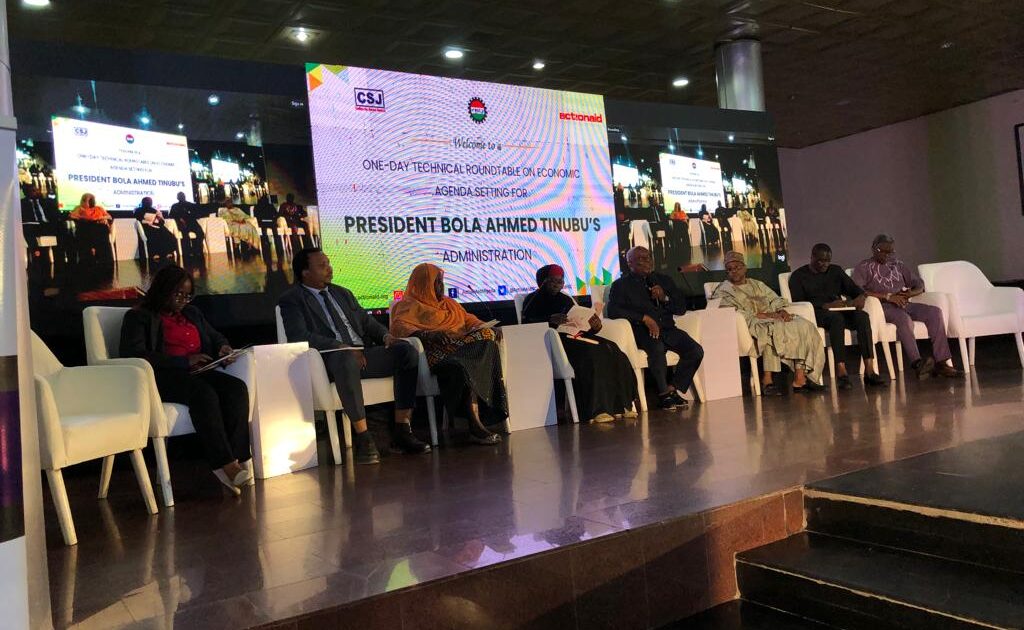CSJ’s Joint Economic Strategy Roundtable Unveils Critical Recommendations For Tinubu Administration
CSJ’s Joint Economic Strategy Roundtable Unveils Critical Recommendations For Tinubu Administration
-
August 16, 2023
- Posted by: Center for Social Justice

The Centre for Social Justice (CSJ) and Action Aid Nigeria (AAN) alongside the Nigerian Labour Congress (NLC) have convened top experts, policymakers, and stakeholders, to a one-day Technical Roundtable on Economic Agenda Setting for President Bola Ahmed Tinubu’s Administration in Abuja. Attendees included representatives from diverse Ministries, Departments, Agencies of the Federal Government, the private sector, and civil society.
The roundtable under the theme “Economic Blueprint for the Tinubu Administration,” aimed to foster a nationwide discourse on vital economic strategies and priorities for the nascent Tinubu government. Discussions also delved into internal avenues for expanding Nigeria’s fiscal capacity to finance sustainable development. Furthermore, the event sought to provide essential insights enabling Civil Society Organizations (CSOs), the private sector, and the broader citizenry to effectively engage with the 2023 Federal Government of Nigeria Appropriation Act, particularly in terms of funding, implementation, and service delivery.
The comprehensive discussions yielded critical insights and actionable recommendations for the Tinubu administration. Notable points of interest included the alarming burden of Nigeria’s debt, with a significant portion of retained revenue dedicated to servicing debts. The World Bank projected this trend could escalate to 121% of revenue in 2023, raising concerns about fiscal sustainability.
Another poignant issue spotlighted was the surge in poverty levels, with an estimated 4 million Nigerians thrust into poverty within just five months of the year. The imperative to tackle oil theft was also emphasized, as staggering quantities of crude oil were revealed to have been stolen over the years.
The roundtable attendees voiced compelling recommendations to address these challenges. Among them, the need for a moratorium on new debts, the activation of real-time online monitoring of pipelines, and strategic investments to enhance oil production. Tax reforms, enhanced tax administration, and industrialization were proposed as essential strategies for economic growth.
The recommendations distilled from this landmark gathering illuminate a comprehensive roadmap for the Tinubu administration as it navigates through complex economic challenges. The Technical Roundtable has provided a robust foundation for forging a more resilient and prosperous economic future for Nigeria.
The Centre for Social Justice (CSJ) and Action Aid Nigeria (AAN) alongside the Nigerian Labour Congress (NLC) have convened top experts, policymakers, and stakeholders, to a one-day Technical Roundtable on Economic Agenda Setting for President Bola Ahmed Tinubu’s Administration in Abuja.
Attendees included representatives from diverse Ministries, Departments, Agencies of the Federal Government, the private sector, and civil society.
The roundtable under the theme “Economic Blueprint for the Tinubu Administration,” aimed to foster a nationwide discourse on vital economic strategies and priorities for the nascent Tinubu government. Discussions also delved into internal avenues for expanding Nigeria’s fiscal capacity to finance sustainable development. Furthermore, the event sought to provide essential insights enabling Civil Society Organizations (CSOs), the private sector, and the broader citizenry to effectively engage with the 2023 Federal Government of Nigeria Appropriation Act, particularly in terms of funding, implementation, and service delivery.
The comprehensive discussions yielded critical insights and actionable recommendations for the Tinubu administration. Notable points of interest included the alarming burden of Nigeria’s debt, with a significant portion of retained revenue dedicated to servicing debts. The World Bank projected this trend could escalate to 121% of revenue in 2023, raising concerns about fiscal sustainability.
Another poignant issue spotlighted was the surge in poverty levels, with an estimated 4 million Nigerians thrust into poverty within just five months of the year. The imperative to tackle oil theft was also emphasized, as staggering quantities of crude oil were revealed to have been stolen over the years.
The roundtable attendees voiced compelling recommendations to address these challenges. Among them, the need for a moratorium on new debts, the activation of real-time online monitoring of pipelines, and strategic investments to enhance oil production. Tax reforms, enhanced tax administration, and industrialization were proposed as essential strategies for economic growth.
The recommendations distilled from this landmark gathering illuminate a comprehensive roadmap for the Tinubu administration as it navigates through complex economic challenges. The Technical Roundtable has provided a robust foundation for forging a more resilient and prosperous economic future for Nigeria.
